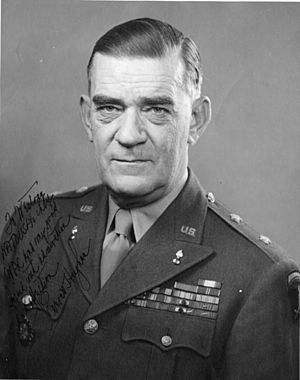Everett Hughes (general) facts for kids
Quick facts for kids
Everett Strait Hughes
|
|
|---|---|
 |
|
| Born | October 21, 1885 Ipswich, Dakota Territory |
| Died | September 5, 1957 (aged 71) Washington, D.C. |
| Allegiance | |
| Service/ |
|
| Years of service | 1908–1949 |
| Rank | |
| Commands held | 17th Chief of Ordnance (1946-1949) |
| Battles/wars | Mexican Revolution: |
| Awards | Distinguished Service Medal Legion of Merit (2) Bronze Star Medal Legion of Honor (France) Croix de Guerre (France) Order of the Crown (Belgium) Croix de Guerre (Belgium) Order of the Fatherland (Soviet Union) Order of Nichan-Iftikhar (Tunisia) |
Everett Strait Hughes (born October 21, 1885 – died September 5, 1957) was an important American soldier. He became a major general in the United States Army. He was also the 17th Chief of Ordnance, which meant he was in charge of weapons and supplies for the army. Hughes is well-known for working closely with Dwight D. Eisenhower, who later became a U.S. President.
Hughes was born in Ipswich, in what was then called Dakota Territory. He graduated from West Point, a famous military school. He fought in several conflicts, including the Mexican border war and World War I. During World War II, he was a close friend of General George S. Patton. He was also a very trusted helper for General Eisenhower throughout the entire European campaign.
Contents
Early Life and Military Training
Everett Strait Hughes was born in 1885. His hometown was Ipswich, South Dakota. At that time, South Dakota was still a territory.
Becoming a West Point Graduate
Hughes decided to join the military. He attended the U.S. Military Academy at West Point. This is a very famous school for training army officers. He graduated from West Point in 1908.
Starting His Army Career
After graduating, Hughes began his long career in the United States Army. He served for many years, from 1908 until 1949. He steadily rose through the ranks.
Military Service and Key Roles
Hughes played important roles in several major conflicts. He was known for his skills in logistics and supplies. This meant making sure soldiers had what they needed.
Mexican Border War
One of his early experiences was in the Mexican border war. This conflict took place between 1910 and 1919. He was involved in the Battle of San Miguelito.
World War I Service
Hughes also served during World War I. This was a huge global conflict. His experience in this war helped prepare him for future challenges.
World War II: Eisenhower's Right-Hand Man
During World War II, Hughes became very important. He worked closely with General Dwight D. Eisenhower. Eisenhower was the top commander of Allied forces in Europe. Hughes was often called Eisenhower's "right-hand man." This meant he was a trusted advisor and helper.
Campaigns in North Africa and Europe
Hughes was involved in many major campaigns during World War II. These included the Algeria-French Morocco Campaign. He also served in the Tunisia Campaign. Later, he was part of the Sicily Campaign.
Fighting Across Europe
As the war continued, Hughes was involved in more battles. He participated in the Lorraine Campaign in France. He also saw action in the Ardennes Campaign. This was a very tough battle in the winter. His service continued through the Rhineland Campaign. Finally, he was part of the Central Europe Campaign.
Chief of Ordnance
After World War II, Hughes took on another big role. He became the 17th Chief of Ordnance. This job meant he was in charge of all weapons, ammunition, and military equipment for the U.S. Army. He held this important position from 1946 to 1949.
Awards and Recognition
General Hughes received many awards for his service. These awards recognized his bravery and leadership.
American Military Honors
He earned the Distinguished Service Medal. This is a very high honor for American soldiers. He also received the Legion of Merit twice. Another award he earned was the Bronze Star Medal.
International Recognition
Hughes was also honored by other countries. He received the Legion of Honor from France. France also awarded him the Croix de Guerre. Belgium gave him the Order of the Crown and their own Croix de Guerre. He also received an award from the Soviet Union and the Order of Nichan-Iftikhar from Tunisia.
Later Life and Legacy
Everett Strait Hughes retired from the army in 1949. He passed away on September 5, 1957, in Washington, D.C. He is remembered as a dedicated soldier. His close work with General Eisenhower was very important during World War II.

